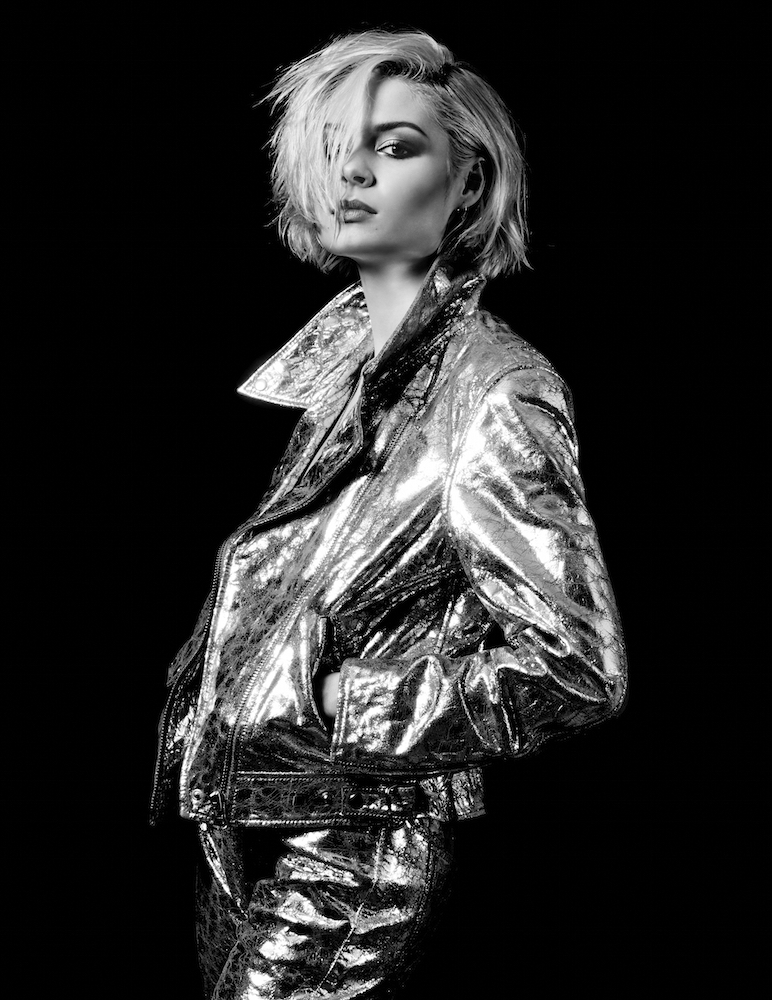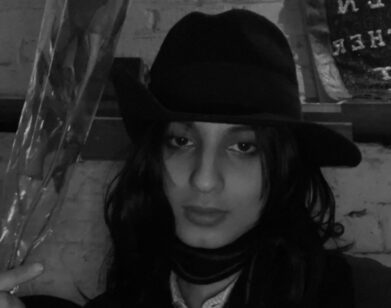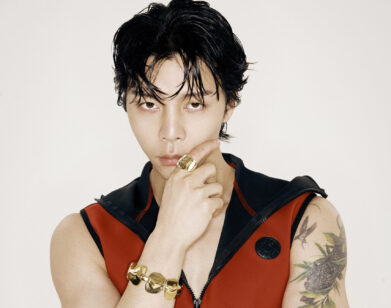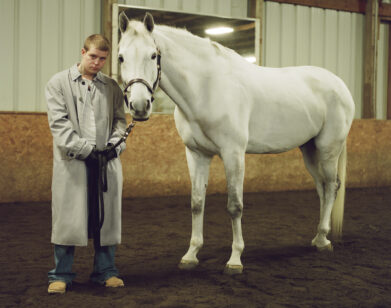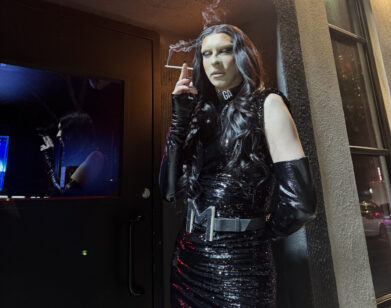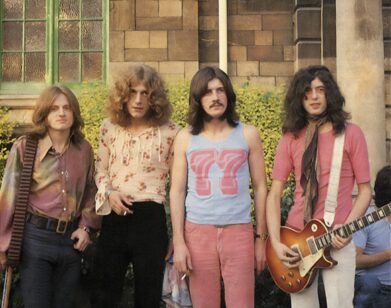Nina Nesbitt’s New Sound
NINA NESBITT IN LONDON, FEBRUARY 2016. PHOTOS: ROBERT BELLAMY. STYLING: LUCY BOWER. HAIR: BEN JONES USING WINDLE AND MOODIE. MAKEUP: HADEEL TAL USING TOM FORD BEAUTY AND SISLEY SKINCARE. MANICURE: MIKE POCOCK/STREETERS LONDON.
Nina Nesbitt first emerged as a bright-eyed, doll-faced 17-year-old singer/songwriter in 2012 upon signing with Island Records. Her folk-pop songs quickly reached the Top 10 on iTunes and led to tours and collaborations with modern music staples, including Ed Sheeran. Last week, after a two-year hiatus, Nesbitt returned with her Modern Love EP. The five-song compilation exemplifies the now 21-year-old’s growth through a stark shift in musical direction. Opposed to her largely acoustic previous releases, Modern Love tracks focus on electronic-pop production.
“I took two years out to find what sound I felt passionate about and what I liked making. After the last album, Peroxide, which is quite poppy and acoustic, I felt really bored,” she tells us over the phone from London. “I didn’t want to make another album like that. I wanted to switch gears.”
Though Nesbitt originally intended to shift away from pop entirely, she “just kept writing it” and found that she couldn’t escape the genre. Her sound deepened when she moved from her small Scottish hometown to London, where she learned to produce and setup a home studio that she calls Nightwatch. “One of the tacks on the EP was written and produced there,” she says. “It’s been a process of meeting new people and learning.” In addition to her own production, Nesbitt worked with Dan Lancaster (Bring Me The Horizon) and Fred Ball (Rihanna), and “that’s all led to the new sound.”
More than just releasing music and playing shows around the world, Nesbitt has also raised more than half a million pounds for the charity mothers2mothers, acted as a Calvin Klein social media ambassador, and was selected to represent The Young Voice at the 2015 Women in The World Summit hosted by Tina Brown.
EMILY MCDERMOTT: To me, “Masquerade,” which was written and produced by you at your new studio, was one of the standout tracks on Modern Love. There’s something about the rawness of your voice…
NINA NESBITT: Oh really? I was interested to see how people would react to that one because it was produced by me, which I’ve not done before. That track started on the acoustic guitar—I still write on the guitar and then transfer them onto production that I feel would suit it—I had the concept and the lyrics and the chorus. How it was written, basically, it that it’s about five different songs. The first one was like a ballroom dance beat. I was like, “This is definitely not right.” Then, I don’t want to compare it to this, but it was kind of like the “I’m on Fire,” Bruce Springsteen guitar sound, that rhythm. I was like, “No, that’s not right…” Then it was some urban, hip-hop beat and I was like, “That’s not right for it either!” Finally, one day, I came up with the guitar riff that’s at the start of the song now and the lyrics fit perfectly. It was quite a long process writing that one.
MCDERMOTT: So did you know anything about production before taking these two years off?
NESBITT: No, it’s something that I’ve learned and developed. It’s something I’ve always been interested in, but it takes time, just like taking up an instrument. Not everyone’s got an interest in it, but I’ve always been really interested and really wanted to be able to do it myself. Working with other people, it’s hard to get them to make it sound like what you have in mind. Also, it’s really expensive to get your tracks produced, so I thought if I could learn how to do it myself, I could make five albums in a month and it would be free, it would be me, and it would be everything that I’m doing. I could make what I have in my mind come to life. I’m really excited by that thought, so I kept going, working toward that.
MCDERMOTT: What is one of the most significant things you’ve learned?
NESBITT: Not to over-produce. I’ve learned not turning things up to full volume is a good idea. Also, because I have the freedom, sometimes when I’m writing a song I’ll get carried away with production when I’m only on the first verse, and that sacrifices the songwriting. So I tend to hold it back and write it on the guitar or piano, and then do the production so it doesn’t become production-driven. I always want it to be a good song firstly.
MCDERMOTT: For “Chewing Gum,” you included the demo, a remix, and the mastered single. As a listener, that’s nice because you can hear the phases a song goes through and the different lives it can breathe. But why, as the creator, did you want to include each version?
NESBITT: I wanted to produce the single as electronic and darker sounding, and that’s probably my favorite version. The remix is for people who want to go out or go in the club—or, when I’m cleaning the house, I always put club music on. [laughs] Then the acoustic, I didn’t want people to go, “You changed your sound, you can’t do songs on an acoustic guitar anymore.” I wanted to show that it can be done acoustically or with electronic elements. If it’s a good song, it should be able to go on different formats and I wanted to show that.
MCDERMOTT: When you play live, do you think you’ll strip down some of the other songs?
NESBITT: Yeah. When I played two weeks ago, I brought back some of the old folksier songs from years ago, but revamped them in the new style. It’s exciting being able to do that, and also take to the new ones and bring them back to the old style.
MCDERMOTT: So two years ago, when you decided to take time off from releasing music, you moved to London. How has being in the city influenced you?
NESBITT: I came from a really small village outside Edinburgh in Scotland and had quite a sheltered upbringing. So when I moved to London it was just like, “Whoa, there’s so much going on.” You meet so many amazing and unique people. Everyone here is going for the same thing. Everyone can be successful and do their own artistic thing. It’s really inspiring to be around. It keeps you on your toes. I like going out as well. It’s such a buzzing, exciting, and kind of gritty city. I definitely wanted to get that into my music, whereas before it was a lot more calm and folky. I wanted to get the harsher side into the new stuff.
MCDERMOTT: I’ve also read that you’re kind of nocturnal. Have you always been that way?
NESBITT: Yeah, I’ve always been nocturnal. I really struggle to get up in the morning, but I also get my best ideas really late at night, when I’m trying to sleep. That’s why I call my studio Nightwatch. I live in a neighborhood that’s very family-oriented, so I feel like everyone else is sleeping and I’m sitting up, making music. It’s just me. It’s a nice time to be creative.
MCDERMOTT: It sounds very peaceful. On this album, you worked with Fred Ball and Dan Lancaster, whereas on your previous album you worked with Jake Gosling and Iain Archer. How did you come to work with Fred and Dan this time around?
NESBITT: I wanted a completely fresh approach. I love Iain and Jake, but I knew I wanted to change sounds so it felt right to try new people. The first time I worked with Fred, two and a half years ago, I was like, “Everything is on acoustic guitar,” and he was like, “Why not try this or that?” I was so against it. Over time, though, I came to really respect that. He tried to push me and show me different things. He’s got this studio built of vintage synths. He’s got a song on Rihanna’s new album, which I am in love with. He’s been really inspiring to work with and comes from a completely different world. As much as it is for me, it’s for him as well; he’s never really done poppy stuff.
MCDERMOTT: What is one of the most memorable things you’ll take away from working with him?
NESBITT: When I used to write songs, especially on my own, it was just me and a guitar. I wouldn’t think, “What should the melody be?” Or, “Is that a good rhythm?” I would literally never think about melody. I never thought people listened to melody because I listen to words. Working with Dan opened my eyes to the thought that melody is probably the most important part, and thinking about that has improved my songwriting.
MCDERMOTT: So in the last two years, with all of these changes personally and musically, what are some of the things you’ve learned about yourself?
NESBITT: I’ve grown up. I was so young when I started—I was 17, from a nice village where nothing really happened. Moving to London was a culture shock, but in a really good way. I’m more aware now, and I’m less trusting of people in the music industry. I’ve definitely learned the hard way about some things. It’s been a roller coaster two years and that’s reflected in the upcoming album, which I’m working on at the moment. It caters toward the highs and lows of being in a new country and being on your own in London at a young age.
The highs were discovering how fun the city is. The low is kind of like, you’re young and have this idea that you sign a record deal and become massive. It doesn’t really work like that and as you get older, you discover what it’s all about—that can be quite hard to deal with. I don’t think I’m delusional, but I’m definitely a dreamer; I definitely want to see the best in things and I believe in what I do. The music industry can be quite a difficult place to remain like that, to remain pure.
MCDERMOTT: When you’re facing struggles within the industry, what helps you get through them?
NESBITT: Writing songs about them. Nothing makes me happier than writing a song that I think is good or that I want to play. Writing songs helps me.
MCDERMOTT: Aside from personal experiences, what do you find motivational or inspirational?
NESBITT: Traveling really inspires me, seeing other cities and going on tour. If you’ve got fans online, it’s hard to remember those people are real people. So when you go on tour and see everyone, you’re like, “Oh my god. This is actually real life.” That inspires me to write more songs. I’ve started getting more into films as well, which has been quite interesting. The song “Take You to Heaven” on the EP was written about a certain film… It’s actually really embarrassing; it’s about The Notebook, when they die together at the end. I was single at the time, but if you are so in love with someone that you wouldn’t want to be without them, imagine if they died before you—it’s a song about wanting to be with someone like that. It’s actually quite morbid.
MODERN LOVE IS OUT NOW. FOR MORE ON NINA NESBITT, VISIT HER WEBSITE.

